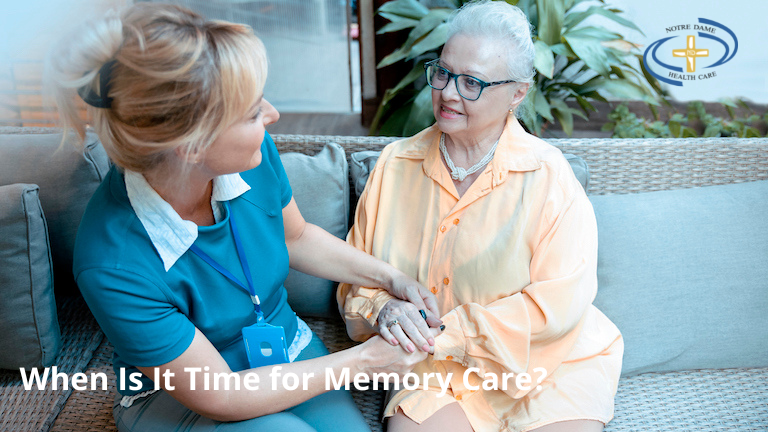Having a loved one diagnosed with dementia can be both scary and overwhelming.
First, know you’re not alone. According to the World Health Organization, more than 55 million people are living with dementia.
Managing the care of a loved one with dementia and knowing when to ask for help is difficult for many families.
Memory care communities are specifically designed to help people living with dementia. These communities are also an excellent source of information and support for family members seeking guidance on finding the best memory care community for their loved one.
Memory care communities have specially trained staff, activities, and living spaces uniquely designed to care for residents with Alzheimer’s, dementia, and other memory disorders.
How do you know when it’s time for memory care? Read on for specific signs your loved one could benefit from a memory care community.
You Worry About Your Loved One’s Safety
Ensuring your loved one’s safety is essential. People with dementia often wander from home, putting them at risk of getting lost or injured.
People with earlier stages of dementia who live alone may forget to lock doors or set alarm systems, increasing the risk of burglaries and break-ins.
Memory care communities are designed and structured to ensure the safety of residents.
You’re Noticing Changes in Behavior
If your loved one is often experiencing confusion, aggression, or agitation, these personality changes can be difficult for a family to manage. Experienced memory care professionals are trained to handle extreme personality changes in people with dementia.
You’re Noticing a Decline in Personal Hygiene
People with dementia often forget to bathe, change clothes or struggle to get to the bathroom on time.
If a loved one cannot perform activities of daily living (ADLs) like bathing, dressing, or toileting, this is a sign it may be time to get additional help.
Memory care professionals will help residents with daily personal care.
Your Loved One’s Struggling with Daily Tasks
If your loved one’s once immaculate home shows signs of neglect – unwashed dishes, unkempt yard, and clutter, memory care communities offer residents a variety of living spaces that include laundry, housekeeping, and meal preparation.
Having a maintenance-free lifestyle allows residents to concentrate on care and family.
You’re Exhausted and Overwhelmed
Taking care of a loved one with dementia is emotionally and physically exhausting, leaving you feeling anxious, overwhelmed, resentful, or angry.
First, know these feelings are normal.
A memory care community will ensure your loved one is well cared for, giving you the support you need to maintain your mental and physical health.
You can’t ensure the safety of your loved one if you don’t take care of yourself.
The support of a memory care team will give you more time to enjoy the company of your loved one.
About Notre Dame Health Care
Notre Dame Health Care (NDHC) offers a range of post-acute programs and services to the community, including an Assisted Living Residence; Adult & Pediatric Hospice and Palliative Care; Post-Acute Recuperation; Short-Term Rehabilitation; Skilled Nursing and traditional Long Term Care; Specialized Memory Care; and an educational resource center which serves our employees and community. We embrace the individuality, spirituality, and wholeness of each member of our community, including our residents, patients, families, volunteers, and staff.
Notre Dame Health Care is proudly non-profit and honored to carry on the mission of the Sisters of Notre Dame de Namur to care for the sick and vulnerable and to educate for life through our NDHC Educational Bridge Center.
Notre Dame Health Care
555-559 Plantation Street
Worcester, MA 01605
(508) 852-5800
notredamehealthcare.org
